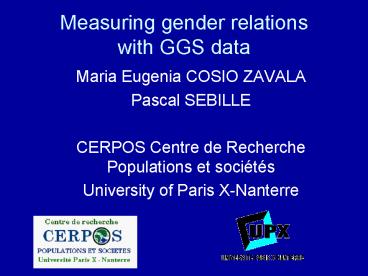Measuring gender relations with GGS data - PowerPoint PPT Presentation
1 / 25
Title:
Measuring gender relations with GGS data
Description:
These surveys aim at exploring relationships ... nuptiality (legal marriage) ... Fertility and nuptiality depend on these personal an union's histories and on ... – PowerPoint PPT presentation
Number of Views:87
Avg rating:3.0/5.0
Title: Measuring gender relations with GGS data
1
Measuring gender relationswith GGS data
- Maria Eugenia COSIO ZAVALA
- Pascal SEBILLE
- CERPOS Centre de Recherche Populations et
sociétés - University of Paris X-Nanterre
2
GGS, Gender and generations surveys
- These surveys aim at exploring relationships
between gender changes and different demographic
outcomes, such as fertility and formal marriage
3
GGS, Gender and generations surveys
- Gender indicators
- The model and pioneer survey five surveys in
Asia (K. Mason and al., 1985) - DHS surveys (including partners negotiations and
including men)
4
GGS, Gender and Generations surveys
- The gender dimension
- In GGS, gender effects can be studied on
- Matrimonial histories
- Fertility (tempo and intensity)
- Living arrangements of the elderly
- Family networks
5
GGS, Gender and generations surveys
- Two classical dimensions of female empowerment
autonomy and responsibilities in the household - We grouped the variables in a different manner
- household organization
- equality between partners
6
GGS, Gender and generations surveys
- Gender definition in GGS is a multidimensional
concept, including different aspects access and
control of resources, such as education, labor,
durable goods control of womens work earnings
by herself and of her goods
7
GGS, Gender and generations surveys
- Autonomy freedom in taking decisions, economic
independence and freedom of movements - Decision power
- Roles
- Values
8
GGS, Gender and generations surveys
- Dependant variables
- - fertility
- - nuptiality (legal marriage)
- union definition (in GGS-ERFI) living together
with the partner at least during 3 consecutive
months
9
GGS, Gender and generations surveys
- Evaluation of the union's probability of giving
birth to a child, of marrying legally in function
of - Sociodemographic variables
- Gender indicators
10
GGS, Gender and generations surveys
- fertility models probability of having a first
child, the last one before the survey, in the
current union, for males and females - marriage models probability of legal marriage
for males and females
11
GGS, Gender and generations surveys
- Explanatory variables are grouped in three sets
- First socio-demographic variables, partners
demographic life course and their human capital
12
GGS, Gender and generations surveys
- Two additional sets with gender variables
- a dimension about unions organization, domestic
tasks by sex, female participation in income and
decisions
13
GGS, Gender and generations surveys
- a second dimension about equality in unions
gender relations, womens participation in
resources management - modern or traditional values (more or less
egalitarian)
14
GGS, Gender and generations surveys
- I. socio-demographic variables
- age groups
- duration of the present union
- matrimonial status
- number of previous unions
- having a child before actual union
- education
- womans type of work (full time, partial time, no
work) - age difference between partners
15
GGS, Gender and generations surveys
- II. Tasks repartition between partners
- Participation in all tasks (scores)
- Womans contribution to income ()
- Participation in decisions (scores)
16
GGS, Gender and generations surveys
- III. Equality/inequality
- Income management by woman (scores)
- Family values
- - modern
- - traditional
17
GGS, Gender and generations surveys
- MODERN VALUES
- Marriage is no more an appropriate institution
nowadays - It is right for partners in an informal union to
live together even if they have no intention of
getting married
18
GGS, Gender and generations surveys
- MODERN VALUES
- If people are not happy in their union, they can
divorce, even if they have children - A woman can have a child and raise it alone if
she does not want to have a stable relation with
a man
19
GGS, Gender and generations surveys
- TRADITIONAL VALUES
- Marriage is a link that lasts during all life, it
is not possible to break it - To grow happy, children need to live in a family
unit with a father and a mother
20
Some results of GGSERFI in France
- Egalitarian variables have a negative effect on
the fertility and marriage probabilities. - Partners age, former matrimonial histories,
womens work, education and other
socio-demographic variables have a strong
influence
21
Some results of GGS,ERFI in France
- Personal and family lives of both partners are
highly important, including matrimonial
experiences before current union - They have a significative weight in relation
with gender indicators, before and during the
actual union
22
Some results of GGS,ERFI in France
- Fertility and nuptiality depend on these personal
an unions histories and on equalitarian or not
equalitarian gender relations. - It is very interesting to have GGS (ERFI in
France) to show these interactions
23
Some results of GGS,ERFI in France
- In France, unions organize tasks with a strong
specialization by sex. In 8 unions among 10,
women do more (much more) domestic tasks than
men. - BUT equality is predominant in the management of
resources, with 8 unions among 10 sharing them in
an egalitarian way
24
To know more
www-erfi.ined.fr
Contact cosio_at_u-paris10.fr pascal.sebille_at_wanad
oo.fr
25
Thank you!.....
www-erfi.ined.fr
Contact cosio_at_u-paris10.fr pascal.sebille_at_wanad
oo.fr































